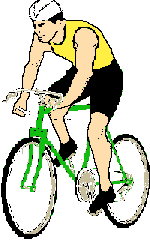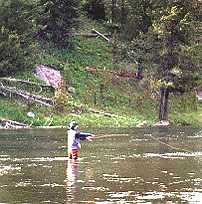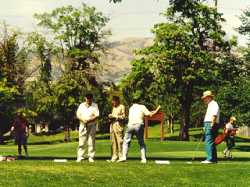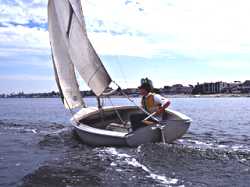Sports and
Outdoor Pursuits |
Introduction
Sport has a long, proud tradition in British history with many of today's most popular world sports having been born in the UK. The more obvious ones include football (soccer), tennis, golf, cricket and rugby, but do not forget the many others including boxing, table tennis, hockey and squash.
There is some debate as to which is Britain's national sport, with football and cricket being perhaps the strongest contenders. But it is fair to say that everyone in the UK, from the oldest to the youngest, will have their favourite spectator sport that they love to watch. From the genteel atmosphere of Wimbledon to the lively terraces of the FA Cup Final, there is something for everyone.
Throughout the year there are numerous excellent sporting events held. Examples include the British Open (golf), Test Cricket, horse racing events such as Ascot and the Grand National and the Five Nations Championship (rugby). But tickets for big events such as these are very sought after so if you want to go, book well in advance.
As well as watching your favourite sport, you may also be able to take part in it. Many towns have public tennis courts available, whilst the UK is literally strewn with golf courses. With some sports such as football and cricket, it may be more difficult to take part, but if you are desperate you may be able to join in a local team somewhere.
Alongside the major sporting events, everyday outdoor pursuits are also hugely popular in the UK. There is a long rural tradition of 'country' pursuits such as hunting, fishing and shooting, and you can still take part in these if you wish. Some areas, such as the highlands of Scotland have become particularly well known for having facilities for these sorts of activities.
Outdoor pursuits such as hiking and horse riding are also still very popular across the UK. For the visitor activities such as these are great ways to get off the beaten track and explore the beautiful British countryside. But make sure that you are well prepared for the countryside does contain some hazards - seek local advice, wear appropriate clothing and never wander off without a map.
And although the seaside is probably not the reason you choose to visit the UK, watersports are very popular in the UK as well. Whether it is swimming, boating or jet skiing that you want, you should be able to find it. Even surfing is becoming increasingly popular, so if you are a surf fan you may be able to catch a wave.
|
Outdoor pursuits
The right kit is essential if you plan to take part in any outdoor pursuits for the British weather can be very changeable, even at the height of summer. And remeber that if you are in a sheltered valley and plan to hike up a hill, the temperature will be a lot colder at the top.
It is also important that you do not ruin the countryside for others by dropping litter, lighting fires or leaving gates open.
Here are some suggestions of things you should bear in mind:
|
| Do | Do not |
- Wear appropriate clothing, for example lots of layers, stout walking boots and warm socks
- Carry some waterproof clothing
- Take a hat and gloves
- Take some high energy food and some water
- Carry a good, detailed map
- Carry and know how to use a compass
- Check the weather forecasts before you go
|
- Wear Denim Jeans
- Wear cotton as an outer layer
- Underestimate the weather
- Walk on your own in remote areas
- Abuse the countryside
|
|
Football
 |
Football (soccer) is one of Britain's most popular sports and for many fans the success of their favourite team is very serious business indeed. The most popular teams in the UK are the ones in the premier league and include, among others, Manchester United, Liverpool, Arsenal, Chelsea, and Aston Villa. The main teams in Wales are Cardiff and Swansea, whilst Scotland has its own league.
The UK's football season is from August until May with most matches being played at weekends. The season culminates in the FA Cup Final at Wembley in London which is one of the biggest sporting events of the British calendar. Tickets for many matches are easy to come by, but for the popular premier league games it is more difficult, and for the final it is near enough impossible. Prices range from about £10 to £40 depending on the club and the importance of the match. |
In international games each country unites behind its team, but when it comes to domestic football games it is a different matter. Support for local teams is passionate and rivalry is intense. The most famous rivalry is between two teams in the same city - Glasgow's Rangers (Protestant) and Celtic (Catholic).
Unfortunately the intensity of the rivalry between some teams has resulted in violence in the past. As a result British football's reputation was very poor for many years with many people more aware of its hooligans than its sporting heroes.
Recent years however, have seen a great improvement and so British football at last seems to be cleaning up its act. The introduction of all-seater stadiums has cured many of the problems of the terraces and as a result the game has become much more friendly. So if you fancy seeing a match, don't let the reputation put you off and go and see a match.
But if you are easily offended, be warned - the atmosphere in football stadiums can still be quite bawdy and aggressive so unless you are a keen fan it is probably best to stay away.
Rugby
Tradition has it that in 1823, during a football match at Rugby school in Warwickshire, a student named William Ellis picked up the ball and ran to the goal with it. Thus the game of Rugby was invented, taking its name from the school.
Traditionally the game is known as a gentleman's game, but as the years have gone by class distinctions have become less distinct. And in areas such as Wales rugby union is very much the game of the working classes. |
 |
Also known as "Rugger", there are now two versions of the game -
Rugby League and Rugby Union:
- Rugby Union has 15 players on each side and is mainly played in Wales, Scotland and the south of England. This version of the game only became a professional sport in 1995.
The Rugby Union season runs from September to April and culminates in the Pilkington Cup played at Twickenham in London. In January each year there is also the Five Nations Championship played between the four British nations and France.
- Rugby League has long been a professional sport, is played with 13 players on each side and is more common in northern England. The rugby league season runs from March/April to August, with the highlight of the year being the Super League final held at Old Trafford in Manchester in September.
Tickets for big games are scarce but you can still see quality rugby up and down the country at local games. Popular rugby union clubs include Leicester, Bath, and in London the Harlequins, whilst the more well known rugby league clubs include St Helen's and Wigan.
| Cricket |
 |
Cricket often claims to be the English national sport and there is little doubt that it is extremely popular. And for visitors the sight of a group of men in cricket whites playing on the local village green is quintessentially English.
The game was invented in the 18th century and the Brits quickly took the game around the world as their empire expanded. Nowadays the teams from former colonies such as West Indian and India regularly beat Britain during international test matches. |
To the uninitiated it may seem like a bizarre, and boring, sport. Games can appear to be excruciatingly slow and test matches can last for up to five days and yet still not produce a clear winner. Yet the rules are incredibly complicated and a win requires a mixture of skill and clever tactics. Thus fans claim that it is a highly demanding sport requiring both physical and mental fitness and agility.
The cricket season runs from April to September, with the international test matches being played mid-season. Inter-county matches are played throughout the season, usually lasting three or four days.
If you'd like to see a match but don't think that you can stand 4 or 5 days of it, try one of the one-day matches, such as the Benson and Hedges Cup and the Nat West Trophy that are held during the season.
|
|
Golf
Golf originated in Scotland and dates back as far as the 15th Century. Today it is still as popular as ever as can be seen by the vast number of courses in the UK - currently there are almost 2000!
|
Many courses in the UK are open to the public with a round normally costing between £5 and £10. But it should be noted that a lot of public courses get extremely busy, especially at weekends, So if you want to play it is probably best to book in advance. Also it would be wise to check whether you need to bring your own clubs, if there are any rules you should know about, and if there is a dress code.
Some hotels that are based near popular golf courses are keen to promote themselves as the ideal place for golfers to stay. Many will arrange tailored golfing holidays for you, which will include some rounds at the local course in the price.
St Andrews
St Andrews is famous as the home of golf and it is here that you will find The Royal and Ancient Club. This club is perhaps the most important in the world as it is the game's governing body.
It is also in St Andrews that you will find the most famous golf course in the world, the Old Course.
If you are a fan of golf you will be pleased (and probably amazed) to find that the Old Course is, in fact, open to the public. But prices are high and to have any chance of getting a round in you'll have to book months in advance.
|
|
Tennis
|
During the last week in June and the first week of July, one of the highlights of the UK's sporting calendar takes place - Wimbledon. Not only a big event in the UK, Wimbledon is one of the biggest and most prestigious tournaments in world tennis.
You will be very lucky to get a ticket to centre court and if it is an important match it would probably cost you the earth. But you can get a seat on one of the lesser courts quite easily just by turning up and queuing - tickets can cost less than £10 this way.
It may take around an hour to get your ticket, but the excellent atmosphere as people wait for games to start can make it a reasonably enjoyable wait. If you want to avoid the queues get there extremely early - lines start to form as early as 6am. |
 |
If you like to play yourself, you will find public courts in many towns and cities with games often being very reasonably priced. Larger hotels, particularly 'country' ones, also sometimes have courts available to guests.
|
|
Watersports
In Britain you are never very far from water. There are miles and miles of coastline along with numerous rivers, canals and lakes. As a result there are also lots of facilities for water sports.
If you like rowing or canoeing, there are plenty of rivers where you can have a go, and sailing is available all along the coast. Windsurfing and Jet skiing are also becoming increasingly popular, so you should be able to find some facilities reasonably nearby. |
|
If you prefer to take things a bit easier boating is also very popular. Many towns and cities have rivers running through them and some will offer cruises, which can be a wonderful way to see another side of a city.
There are also over 3000 miles of canals in the UK which offer a valuable opportunity to boating enthusiasts. These are the legacy of the industrial revolution and today are a hugely popular way of seeing Britain. Many are banked by picturesque villages and riverside pubs so boating on them can be a great way to see the countryside. Enthusiasts even claim that even industrial cities become beautiful and interesting when seen from the water.
In order to tour the canals it is best to rent a narrowboats which can be hired from numberous rental companies. Normally people hire these for a minimum of one week, but shorter breaks are also available. You can then go off exploring on your own. East Anglia, with its network of canals called the Broads, is a particularly popular place for this.
 |
If your favourite sport is swimming there are plenty of facilities available, from the natural habitat of the sea or a lake to swimming pools. If you want to swim in a pool and you are very hardy, there are some outdoor pools available where you can brave the cold water. But there are also plenty of public indoor pools for those who prefer a bit of luxury. Prices for pools vary but most charges are very reasonable.
|
When it comes to beaches, the miles and miles of coastline means that you are spoilt for choice. Some can be quite pebbly but many do have good sand. Wales, Cornwall and some other stretches of the south coast are particularly well known for their good beaches.
Unfortunately, however, many of the UK's beaches are blighted by pollution. To help you pick a good one, look out for European Blue Flags or British Seaside Awards, which indicate that the beach has met high standards of water quality and has good facilities.
Although the sea may look deceptively inviting, it is worth noting that the waters around the UK can be treacherous. Some beaches have lifeguards or operate a flag system which shows the condition of the waters - if the flags are red it means the water is dangerous. Use common sense - if a flag, sign or a local person tells you the water isn't safe do not go in.
| Surfing is on the increase in the UK, with the south-west becoming particularly well known for its surf. The most famous surfing beach in the UK is Fistral beach at Newquay in Cornwall where World Surfing Championships are held each year at the end of July. But there are also lots of other beaches around the country which are suitable for surfing. |
 |
Punting
One of the most stereotypically English past-times is "punting" on the river. The word comes from the name of the boat - a punt is a flat-bottomed boat propelled along by a long pole. The university towns of Oxford and Cambridge are particularly well known for this most English way to spend the afternoon.
|
|
|
|
Horse racing
Horse racing is known as the 'sport of kings' but members of all classes in the UK enjoy it. Tickets to some events can cost less than £5, but if it is a major race and you want to get into the best enclosure it will cost you a lot more.
 |
There are several big horse racing events in the sporting calendar, most being held in the summer months.
The Royal Gold Cup takes place at Ascot and this is perhaps the best known meeting. It always has a big royal presence and it has become a major society date - this is the event where everyone wears a hat, the bigger and more elaborate the better.
Meanwhile, the Derby is held at Epsom racecourse and the Grand National at Aintree. Other lesser-known events are held at racecourses up and down the country. |
| Motor Racing |
| Motor racing is another very popular sport in the UK, so whether its cars or bikes, if you are a fan you will probably be able to catch a live race whilst you are in the UK. |  |
Motorcars: There are usually more than a dozen Formula 1 races held in the UK, with most being held during the summer months. The main motor racing tracks are at Silverstone in Berkshire, Brands Hatch in Kent, and Castle Coombe in Bath.
Races can be quite pricey with even a cheap ticket costing upwards of £20, but fans would say that it is worth it.
And if you fancy having a go yourself, some racetracks now offer some excellent packages. A typical one-day 'open day' would take you round on a tour of the track, give you an insiders view of the workings of the course, and even give you the chance to drive a racing car yourself.
Motorbikes: Motorbike racing is also popular, so if you are keen to see a race there are usually several big ones throughout the year. Events are held at the major car racing tracks as well as some of the smaller tracks around the country.
For details of upcoming motor races or open days, it is best to look in one of the specialist magazines such as Motor Sport.
|
|
Hiking
 |
When you are in the UK, you may well notice signs indicating a public footpath or bridleway. In fact, there are more than 100,000 miles of footpaths in England and Wales alone - which will give you an idea of just how popular hiking (or rambling) is amongst the Brits.
Public rights to footpaths are heavily protected by the law. This is the result of a long tradition of public 'rights of way', which also means that some paths date back centuries.
|
As a result of this protection of paths, you may find yourself on one that cuts right through what is clearly someone's land, for example through a farmyard. This may make you feel a bit uncomfortable, but if it's a public footpath it's your right of way!
However, this does not mean that you have rights over all land. For example, while you may assume that areas such as the National Parks would be accessible to public often this is not the case. So just because you see a sign saying National Park or Area of Outstanding Beauty do not assume it is open to everyone.
The best advice is to not assume right of way, unless an area is clearly open to the public or the path is clearly marked as a public footpath. If in doubt, do not go traipsing across a piece of land or you may find yourself in trouble for trespassing.
And the difference between a footpath and a bridleway is that a footpath (indicated by yellow makers) is accessible only to walkers, whereas a bridleway (indicated by blue markers) is also open to horseriders and cyclists.
If you want to go hiking but are not sure of a suitable route, there are many books available which give details of local walks. These will often cover the best scenery in an area so are a good way to choose where to walk. And they have the added bonus of helping you to not get lost.
|
For visitors, hiking is an excellent way to see the countryside. But do take care, as some areas can be hazardous. Make sure that you dress appropriately, take a good map and compass and check the weather forecast before you go. Another good idea is to let someone know where you are going and when you expect to be back.
In addition, always follow what is known as the 'countryside code'. These are simple rules of common sense that ensure that you do not inconvenience landowners and that the countryside is not spoilt for everyone else. For example, if you have to open a gate, always shut it behind you, don't light fires, pick up any litter and be careful that you don't pollute streams or rivers.
|
Long Distance Walks
If you are very keen and energetic, there are some long distance walks dotted around the country that you can try. Some have been designated as 'National Trails', which are waymarked with an acorn symbol, whilst others have simply become well known as good routes over the years.
Most of these long distance paths do not stray too far away from civilisation so it is possible to walk them whilst staying in guest houses or bed and breakfasts along the way. But if you plan to do them in the height of summer they can be quite busy, so it is best to book your accommodation in advance.
Make sure that you do not underestimate the hazards of hiking just because you are walking on an official route. Wear appropriate kit, and take a map and compass. Always check the weather forecast and heed local advice. Guide books are available for most of the walks, and the best maps are usually the very detailed Ordnance Survey Pathfinder series.
National Trails in Southern England
|
South West Way
This path follows the coast from Minehead in Somerset to Poole in Dorset, going around the whole of the coasts of Devon and Cornwall. At nearly 600 miles long it is the biggest long distance walk.
As well as being long, it is also quite hilly so it is one of the most strenuous paths - it would probably take about eight weeks to do in one go. As a result most people just do a small section, with the majority electing to just do the coast of Cornwall. This is a much more reasonable distance, which would take about two weeks to complete.
Cotswold Way
This 100 mile long path takes you from just south of Stratford-upon-Avon all the way down to Bath, taking about a week to complete.
It goes right through the Cotswold Hills, thus taking in some of the most beautiful scenery in England. This is where you will find the stereotypical England of picturesque villages nestling in beautiful valleys. It is also a particulalry good route for budding historians as the trail takes in lots of historical sites from prehistoric forts and roman remains to stately homes.
The Ridgeway
This path takes you along an ancient route that claims to be the oldest road in the UK. It goes from Ivinghoe Beacon in Buckinghamshire to Avebury in Wiltshire, taking you across the Chiltern Hills. It is 85 miles long making it one of the shortest long-distance trails, and it should take just under a week to walk the length.
Thames Path
This path follows the 180 mile long River Thames from its source in Gloucestershire all the way to the Tames Barrier in London. As a result the scenery is very varied, from idyllic rural scenes to urban streets. It would probably take about a fortnight to complete this path.
South Downs Way
This path is 100 miles long going between the famous Cathedral city of Winchester in Hampshire and Eastborne on the Sussex coast. The scenery is beautiful and varied with everything from spectacular sea views and white chalk cliffs to wooded hills and picturesque valleys.
This path is the most historic long distance route for the area that it goes through has some of the earliest evidence of human settlement in the UK and the path itself actually follows an ancient trail that was in use over 4000 years ago.
It would probably take about a week to complete this walk. It is worth noting that it is one of the easier National Trails and it is also a bridleway so it can also be used by horseriders and cyclists as well as hikers. This means that it is one of the busiest long distance walks.
Norfolk Coast Path (and Peddars Way)
This 100 mile long path goes right across Norfolk, following the path of a Roman road. It would take about a week to complete it on its own. However at one end (Cromer) you can carry on for another 40 miles or so until you reach Great Yarmouth, whilst at the other end (Knettishall) you can pick up the 100 mile long Icknield Way.
The Icknield Way starts in Ivinghoe Beacon, which is where the Ridgeway Path also ends. So if you really wanted to you could walk all the way from the start of the Ridgeway Path at Avebury to Great Yarmouth on the Norfolk coast. However, this would be a mammouth 325 miles long, taking at least three weeks to complete.
|
National Trails in Wales
|
Pembrokeshire Coast Path
This is a 190 mile long path along the cliff tops of south-west Wales, offering some spectacular scenery. The area is also renowned for its wildlife and is of particular interest to birdwatchers. It would probably take you about two weeks to do the whole distance.
Offa's Dyke Path
In the 8th Century, King Offa of Mercia built a huge dyke to separate his kingdom from Wales, and it has pretty much marked the boundary of England and Wales ever since. This path, roughly following the dyke, is about 170 miles long taking it from the north Wales coast, through the Wye Valley to Chepstow in the south. The scenery is stunning along the route which would probably take a little under a fortnight to complete.
At Knighton, midway along the Offa's Dyke Path, a 120 mile long trail called Glyndwr's Way breaks off. If you choose to follow this trail it will take you right through central Wales.
|
National Trails in Northern England
|
The Pennine Way
This is one of the oldest official long-distance walks, taking you along the Pennine Mountain ridge from England into Scotland. The route is 250 miles long and is one of the most arduous paths, not least because of the unpredictable mountain weather. Unless you are extremely fit it would probably take three weeks to complete.
But if you are fit enough, the rewards are excellent for the scenery can be breathtaking. The route takes in some of the most popular countryside in England including the Yorkshire Dales, the Northumberland National Park and the scenery of northern England made famous by the Brontë sisters.
Cumbria Way
Compared to some of the longer walks, this one could be considered short. But it is still 70 miles long, taking four or five days to complete. If you want to do some walking, but are not sure that you are up to the biggies then this is definitely the trail for you.
Not only is it a reasonable distance, it is also a relatively easy route. And it takes you through some of the most beautiful scenery in England, for it goes right through the Lake District National Park.
Cleveland Way
This is one of the oldest National Trails and takes in the scenery of the beautiful North York Moors National Park. The route is about 110 miles long, and it is quite challenging so it would probably take about two weeks to complete. However, there are lots of short cuts you can take to make it a bit easier.
It is also one of the most interesting paths, for the route takes in a wide range of scenery including rugged coastline, heather clad moors and beautiful valleys. There are also lots of historical sites such as ancient forts, Roman remains and medieval castles to visit.
|
National Trails in Scotland
|
West Highland Way
This is a 100 mile long route that takes you through the beautiful countryside of the Scottish Highlands. It begins in the Lowlands near Glasgow and then winds past the mountains, lochs and rivers that have made the Highlands famous.
Although the path goes through some spectacular mountainous countryside, the route is not too arduous and should take about a week to complete. But the mountains do mean that the weather is a big consideration so make sure that you are well prepared to cope with the elements. It is also worth noting that in summer the area can be plagued by midges, so a good insect repellent is also a good idea.
|
Non-National Trail Walks
|
The Dales Way
This is not an official National Trail, but it is a well recognised and extremely popular route. It is about 80 miles long and takes in not one, but two of the most famous of England's National Parks - the Lake District and the Yorkshire Dales. This is also a very historic route for the path follows some ancient tracks. It would probably take about a week to complete.
Coast to Coast Path
This is a 190 mile long path taking you from Robin Hood's Bay on the east coast of England to St Bees Head on the west coast. Although it is not an official National Trail, it is a well-recognised route taking you across the three national parks of the Lake District, the Yorkshire Dales and the North York Moors.
As a result it takes in some spectacular scenery, but it is also quite a hard walk, taking at least two weeks to complete. Luckily, however, there is a minibus known as the Coast to Coast Packhorse that runs the length of the walk carrying back packs between pick up points along the way. This makes life a lot more comfortable, and if you have had enough you could even hitch a lift.
Hadrian's Wall
Hadrian's Wall stretches for 70 miles along the north of England. It was built in AD122 by the Roman Emperor Hadrian to keep the marauding Scots out of England and is now a World Heritage Site. Although there is not a National Trail along the wall just yet (but one is planned), you can do a series of smaller hikes across the route.
As well as the wall itself, there are several interesting roman forts and temples to see in the area.
|
|
|
Cycling
Cycling is another great way to explore the UK and you will discover some beautiful scenery if you decide to travel by bike.
When cycling in Britain remember to ride on the left. You are not allowed to cycle on motorways and you may find that many of the primary roads are too busy to be enjoyable. Stick to minor roads and lanes and you will probably have a much more pleasant ride.
You can cycle on any road that has a public right of way and on bridleways, but bikes are not allowed on footpaths. A good way to figure out where you can or can not go is to buy an Ordnance Survey Map, which should have public roads and footpaths clearly marked. |
 |
Cycling helmets are advisable but not compulsory, and if you are carrying a child you must have a proper child seat fitted. It is illegal to ride on the pavement (sidewalk) and if you are riding at night you should have, at the very least, a rear reflector, although a full set of lights is preferable. It is also advisable to invest in a secure lock as thefts of bikes are quite common.
When deciding your route, there are lots of guide books and maps available that will suggest specific cycling routes. Otherwise head for the areas that are well known for their beauty for example Cornwall, Wales, the Cotswolds, the Yorkshire Dales and the Highlands of Scotland (unfortunately the most beautiful areas are often the most hilly!) and ask a local Tourist Information Centre for advice.
Above all avoid riding a bike in London at all costs - the traffic is horrendous at best, life-threatening at worst.
As with walking, take sensible precautions when going for a cycle ride in the countryside. Make sure that you check the weather forecast before you go, dress appropriately, take a good map and a compass. Another good idea is to let someone know where you are going and when you expect to be back.
And follow the rules of the 'countryside code' so that you do not inconvenience landowners or spoil the countryside for everyone else. For example, if you have to open a gate, always shut it behind you, do not light fires, pick up any litter and be careful that you do not pollute streams or rivers.
The Cyclists Touring Club (CTC) is also a good source of information. You have to be a member, which costs around £25 a year for adults, but once you have joined they will give you all sorts of information, from suggested routes and cycle hire to local clubs and organised cycling holidays. If you are a member of a Cycling Club in another country, you may find that you can automatically get membership of the CTC so do check.
Contact Tel: 01483 417217 |
Long Distance Routes
|
If you are the long distance type, a favourite ride for cyclists is the journey from John O'Groats to Lands End. This route is about 1000 miles long and goes the length of the UK from the northernmost tip of Scotland to the southernmost point of England. This is a challenging ride that will take two to three weeks to complete.
If you want to go East to West, there is a 700 mile long route that goes between Lowestoft Ness on the east coast of Suffolk to Ardnamuchan Point on the west coast of Scotland. Again this is quite a challenging route so expect it to take at least two weeks.
There are lots of other well known long distance routes (for example another coast to coast route that takes you across Scotland) which the Cyclist Touring Club should be able to advise you on.
If you prefer a slightly less challenging ride of one or two hundred miles, there are also lots of popular shorter routes through particularly scenic parts, for example the Yorkshire Dales and Cornwall. If you head for a well known tourist area, you should be able to pick up a guide book that will suggest a route, or ask a local Tourist Information Centre for advice.
|
| Practical Information |
Bringing your own bike: If you wish to bring your own bike, many airlines will happily carry your bike for you. But make sure that you tell the airline of your intention well in advance in case they are unable to oblige, and find out what the dismantling requirements are. If your bike does not exceed your personal weight allowance you may be able to take it for free, but if it is over expect to be charged an excess baggage fee.
Hiring bikes: There are lots of places where you can hire bikes in the UK, so you may not want the bother of bringing your own. A good place to try is a cycle shop in a reasonably sized town or city, and if they can not help you out they should be able to advise you where to try next.
Taking your bike around the UK: When you are in the UK you will find that many of the rail companies will be happy to take your bike trains. However in some cases there may be restrictions during rush hours or you might be required to make a reservation or charged a fee.
To avoid any problems make sure that you check the bike regulations of all train journeys you plan to make, at least 24 hours in advance. Many ferries will also take bikes, usually without a fee or any reservation. Coach companies, however, will not normally allow you to take your bikes on board.
|
|
Pony Trekking
|
 |
There are lots of opportunities for horse riding in the UK, whether you are a beginner or an experienced rider. Although you may struggle to find a riding school in the heart of a big city, if you head out of town you should find at least one or two schools in countryside regions. |
You could choose to have a formal lesson at a riding school, but many visitors prefer to go out on a trek as this allows you to see the countryside. Many treks will cater for beginners and will stick to a gentle walking pace. So if you are more experienced make sure that you inform your guide who will be able to tailor the trek to suit your ability.
You can also pretty much choose the length of ride that you want, from one hour to a whole day. Riding holidays are also very common so you could even go for a whole week or more.
|
|
| Fishing |
 |
Angling has a long history in the UK, and some British rivers have become world famous for the quality of their fishing. However, there are strict laws that govern fishing in Britain so unfortunately you can not just find a river you like the look of and drop a line in.
For starters, you must hold a valid fishing licence, prices of which vary according to the type of fishing you wish to do and the length of time the licence will last. To give a rough idea, a one-day coarse fishing licence would cost around £2 whilst a one day salmon fishing licence would be around £5. Licences can last from one day to one year and can be bought from Environment Agency Offices or from Post Offices. |
There are also distinct fishing seasons which, to complicate matters, vary according to the type of fishing and the region the river is in. Check with the local Environment Agency who should be able to advise you on license requirements and relevant fishing seasons.
In addition, some stretches of river bank (unfortunately often the stretches with the best fishing) are privately owned and you will have to pay a fee in order to fish there. Prices for premium stretches of river that are privately owned can be extortionate.
So before you fish anywhere, always check that you hold the correct licence, that you are fishing in season and that you have the landowner's permission.
|
|
Copyright © 1995 to 2016 Smooth Hound Systems
Smooth Hound Systems accepts no liability with regards to the accuracy of the information on this site.
Users are advised to double check information such as dates, times, prices etc.














